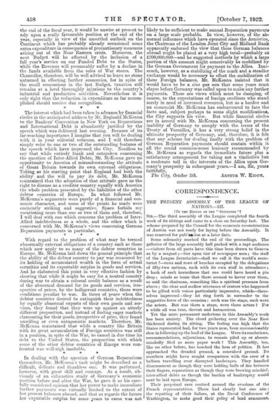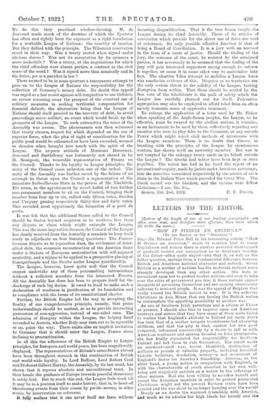CORRESPONDENCE.
THE PRESENT ASSEMBLY OF THE T:EkGUE OF NATIONS.—III.
[To THE EDITOR OP THE " SPECTATOR.")
Sur,—The third assembly of the League completed the fourth week of its sittings and came to a close on Saturday last. The scheme prepared by the Council for the economic reconstruction of Austria was not ready for laying before the Assembly. It was reserved for publ*Wion at a later date.
Some solemnity marked the end of the proceedings. The galleries of the large assembly ball packed with a rapt audience —visitors from all parts have this time been drawn to Geneva as by a magnet ;—tier upon tier of newspaper men ; the staff of the League Secretariat—shall we call it the world's secre- tariat ?—rows and rows of benches occupied by the delegations of fifty-two nations, each with its own staff in attendance ; a hush of such inwardness that one could have heard a pin drop ; minds so tense that there seemed to hover over them, so said the chairman, something like a spiritual presence from above ; the clear and mellow utterance of orators who happened to be gifted with voices particularly impressive, which—them- selves impressed—they let ring forth in surrender to the suggestive force of the occasion : such was the stage, such were the actors. But was there a stage, were there actors ? For a while all was true, devout and harmonious.
Yet the more permanent undertone in this Assembly's work has been anxiety. The cloud gathering over the Near East thickened during its sitting. The feeling ran high that tho States represented had, for two years now, been unconscionably slow in following up the lead of the League. Were its resolutions, recommendations, adjurations, to remain piled up or absent- mindedly filed as mere paper work ? This Assembly, too, like no other before, has touched the hem of politics. It has approached the dreaded ground, a convulsed ground. Its members might have sought comparison with the crew of a balloon travelling over disrupted landscapes. They handled disarmament as though they were holding balls of fire between their fingers, reparations as though they were brewing mischief, inter-allied debts as though the burden of bankruptcy would next be laid upon Europe.
Their perpetual care centred around the evasions of the French representatives. These had clearly but one aim : the repairing of their failure, at the Naval Conference of Washington, to make good their policy of land armament.
To do this they practised window-dressing. M. de Jouvenel made much of the doctrine of which the Spectator has often and rightly been the exponent as a right foundation for a workable League of Nations : the sanctity of treaties. But they dallied with the principle. The Wilsonian reservation stood in their way. Was a treaty sacred when signed under obvious duress ? Was not its acceptation by its sponsors a mere makeshift ? Was a treaty, at the negotiations for which the chief offenders were absent parties, a contract in the civil sense of the word ? Was it signed more than nominally and in the letter, per se a paradox in law ?
There seemed to be in some quarters a transparent attempt to pass on to the League of Nations the responsibility for the collection of Germany's money debt. No doubt this appeal was urged as a last resort against self-temptation to use violence, an excuse screening away the prospect of the eventual use of military measures in seeking territorial compensation for financial default, the alternative being that the League of Nations should itself proceed to the recovery of debt, to avoid proceedings mann militari, an event which would break up the prospects of the League. To such extremities the sense of the Assembly was averse. The phenomenon was then witnessed that treaty clauses, respect for which depended on the use of superior force, when the plea of right or consideration for the public good would be exhausted or have been exceeded, seemed to dissolve when brought into touch with the spirit of the League. The ex-parte attitude of Messieurs Hanotaux, Jouvenel and Barthelemy was fortunately not shared in by AL Bourgeois, the venerable representative of France on the Council. Thanks to his loyalty to League principles, the unity of the Council came unbroken out of the ordeal. The unity of the Assembly was further saved by the failure of an attempt to thrust upon the Council a representative of the immature Serbo-Slovene State in the person of Mr. Ninchitch. His name, in the appointment by secret ballot of two further non-permanent members to sit on the Council, bringing their number from four up to six, rallied only fifteen votes, Sweden and Uruguay gaining respectively thirty-five and forty votes. This revealed most opportunely the formation of a parti du centre.
It was felt that the additional States called to the Council should be States beyond suspicion as to motives, free from any dispute or claim which might entangle the League. This was the more imperative because the Council of the League has clearly received from the Assembly a mandate to keep itself ready to adjudicate on four burning questions : The Franco- German dispute as to reparation dues, the settlement of inter- allied debt, the economio reconstruction of the Austrian State under a Statute of European neutralisation with self-imposed neutrality, and a regime to be applied to a prospective placing of Constantinople and the Straits under League guardianship.
The League, however, know quite well that the Council cannot undertake any of these peacemaking intromissions without a sufficient mandate from the interested Powers. All the Assembly has done has been to prepare itself for the discharge of such big duties. It owed to itself to make such a declaration of readiness in justification of its foundation and in compliance with the terms of its constitutional charter.
Further, the British Empire led the way in accepting the finality of one comprehensive principle, namely, that peace understandings should be mutual, so as to provide interacting guarantees of non-aggression, instead of one-sided ones. The admission of Hungary within the League, the helping hand extended to Austria, whether Italy may turn out to be agreeable or no, point the way. There exists also an implicit invitation to Germany that it should enter the League, France alone inclining to procrastination.
In all this the adherence of the British Empire to Leave principles, for European and world peace, has been magnificently displayed. The representatives of Britain's sister States abroad have been throughout staunch in this combination of British and world-wide loyalty. In Lord Balfour, Lord Robert Cecil and Professor Gilbert Murray, the Assembly, by its last word, has shown that it reposes absolute and unconditional trust. In their hands the guidance of Europe towards peaceful democracy is safely laid. But to reach this end, the League feels weak till it may be in a position itself to make history, that is, to head off threatening events from their course by pacific means; in other words, by intervention on reference.
It fully realizes that it can never itself use force without
incurring disqualification. That is the true lesson taught the League during its third Assembly. Those of its articles of association which provide for the direct use of force are void of substance. Its only possible effective function is that of being a Board of Conciliation. It is a jury with an assessor in the form of a court of justice. Should the finding of the jury, the sentence of the court, be resisted by the arraigned' parties, it has necessarily to be assumed that the finding of the jury will gain interested supporters strong enough to enforce
it together, or cause it in some other way to materialize into fact. The abortive Vilna attempt to mobilize a League force was conclusive evidence of this. Disputes as to territories are the only serious threat to the solidity of the League, barring disruption from within. That these should be settled by the free vote of the inhabitants is the path of safety which the League has carefully planned out for itself. Federative aggregation may also be employed to afford relief from an often merely romantic sense of oppressive treatment.
To enlarge the application of a term used by Mr. Fisher when speaking of the Anglo-Saxon peoples, the League, to be effective, must be swayed by the civilian nations it contains, as an instrument to be used by them collectively regarding any member who were to play false to the Covenant, or any outside Power which might reject civil methods of intercourse with the League members. There is no doubt that Greece, in breaking with the principles of the League by spontaneous
warfare, has shown itself an unworthy member. But was it not tempted by the unhappy treaty made on its behalf outside the League ? The Greeks had better have been kept in static
pupillari. The writer has had in his hand the report of an international enquiry, made by jurists under American patronage, into the atrocities committed respectively by the armies of each State in the Balkan Wars which preceded the Great War. The Greek record was the blackest, and the victims were fellow Christians.—I am, Sir, &c.,







































 Previous page
Previous page